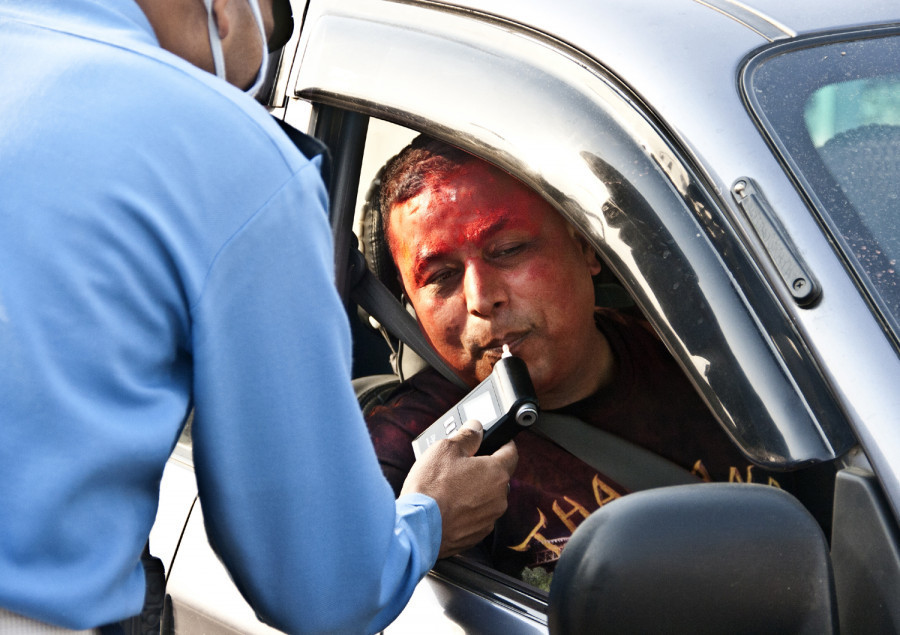Valley
With the opening of night time businesses, traffic police crack down on drink driving
The division office in the past week has booked over 400 people for driving under the influence of alcohol but virologists say using breathalysers is too risky.
Anup Ojha
As night time businesses have resumed operation in the Valley, the Metropolitan Traffic Police Division has started checking drink driving using breathalysers. This has become a cause for concern for virologists, who see a great risk of Covid-19 transmission through shared breathalysers.
The division office in the past week has booked over 400 people for driving under the influence of alcohol.
“After night life opened in Thamel, the number of people driving under the influence of alcohol has increased,” said Shyam Krishan Adhikari, superintendent of police and also the spokesperson at the division.
He said the division is compelled to start monitoring drink driving, also known as MaPaSe, as the number of accidents also increased in the Valley with more people involved in driving under the influence.
“Half a dozen accidents in a day were reported in the past week and most of them were caused by drink driving,” said Adhikari.
According to the Thamel Tourism Development Council, night time establishments in Thamel officially resumed services from Friday after nine months of closure due to the Covid-19 pandemic. The council estimates that over 50 percent of the night market in Thamel had already opened from last week after the Chief District Office of Kathmandu gave them verbal permission to open till 11pm by maintaining health protocols. However, public health officials see a great risk of virus transmission in the absence of stringent monitoring mechanisms.
Besides that, traffic police say that the flow of vehicles in the Valley’s roads has increased of late after the four-month-long odd-even rule ended last week.
Traffic police said over one million vehicles are plying the roads of the Valley every day.
“With the traffic flow increasing, more people are seen driving under the influence of alcohol,” said Senior Superintendent of Police Janak Bhattarai, also chief at the division.
Bhattarai further said that the traffic police are having a tough time checking for drink driving, as people are reluctant to use breathalysers.
“People show reluctance to get checked and try to run away, citing that they might contract Covid-19,” said Bhattarai.
“But we are only checking those who are really drunk. If we don’t do so, there will be many accidents on the road,” said Bhattarai. According to the division’s data, four people were killed in road accidents in Kathmandu in the past month while over a 1,000 minor accidents were reported. Traffic police see drink-driving as one of the main reasons for the accidents.
However, virologists say there is a higher risk of transmission of the disease through breathalysers and that the traffic police should take extra precaution while conducting a breathalyser test on drunk drivers.
“There is a higher risk of traffic police or motorists being infected through dropolers while conducting the anti-drug-drive test with breathalysers,” said Dr Sher Bahadur Pun.
Meanwhile, Bhattarai said that traffic police personnel are even more at risk of getting infected while conducting breathalyser tests on motorists.
“We have provided gloves, masks, glasses and have adopted other precautionary measures for traffic personnel’s safety. We do not have any option other than conducting MaPaSe checks to reduce the number of accidents on the road,” said Bhattarai.
Among all the security forces, traffic police personnel who work everyday on the roads are most vulnerable to contracting the virus. So far, over 400 traffic police personnel have already been infected with Covid-19.
The division office has announced that it will carry out MaPaSe checks in all its 42 units across the Valley. The anti-drunk-drive campaign, which was started on December 2, 2011, has become one of the most successful drives to reduce the number of drink-driving accidents.




 9.7°C Kathmandu
9.7°C Kathmandu.jpg)














